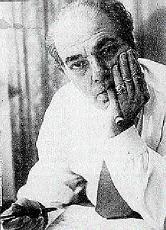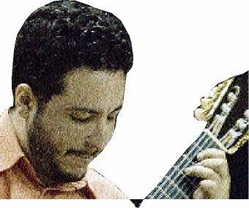
Heitor Villa-Lobos - photos
After delighting Jamaican music lovers during his two-performance visit to the island, renowned Brazilian guitarist, Alvaro Henrique, left last Saturday for Mozambique for a repeat of his Jamaican recital.
That trip will be his first to Africa, Henrique told The Gleaner at the Petroleum Corporation of Jamaica (PCJ) auditorium last Thursday. Sipping a glass of cold juice and speaking fluent, only slightly accented English, the musician appeared relaxed.
But he had just finished a 45-minute first half performance of the music of countryman Heitor Villa-Lobos (1887-1959), with the second half of the concert due to begin in just 10 minutes. And he said playing Villa-Lobos was both "demanding" and "tiring".
However, to Henrique, considered one of his country's "most talented musicians," playing Villa-Lobos had special significance.
"Every musician has a moment when he decides to be a musician," he said, going on to relate how 10 years ago in Sao Paulo, Brazil, during the performance of Villa-Lobos' music by Paulo Pedrassoli, he was inspired to devote his life to playing music.
He had begun studying music five years before, but in that "magical moment", decided he would turn professional. He has since played throughout Brazil, and in Peru, England, Ireland, Greece, Germany and Switzerland.
Influential musician
Of Villa-Lobos, Henrique said that he was not only Brazil's most famous musician but the most influential Latin American musician. "He has influenced composers all over the world," said Henrique. He added that particular attention was being paid to Villa-Lobos this year, the 50th anniversary of his death.
That was perhaps why the Embassy of Brazil invited Henrique to Jamaica to perform the entire solo guitar works of Villa-Lobos. Henrique's first recital here was at the Little Little Theatre last Wednesday evening.
A large number of performing arts students were at that recital, and their reaction to the unfamiliar music was lukewarm. One told The Gleaner the music was "all right," while another commented he was not a fan of classical music. At that point, their teacher told them that they, as budding national and international artistes themselves, needed exposure to "a wide range of musical genres".
Happily, the overflow audience at the PCJ auditorium the following day was more enthusiastic than the students, not surprisingly, as it was more mature in both age and musical experience. Its members not only applauded every one of the numerous, mostly short, pieces that Henrique played over his two hours at the PCJ, at times, they cheered.
Revolutionary innovations

Alvaro Henrique - Contributed
The result was that a clearly pleased Henrique gave not one but two 'encore' items, neither by Villa-Lobos. In addition to playing his acoustic guitar, Henrique introduced each set of musical items.
The audience heard of Villa-Lobos' "revolutionary innovations" in Brazilian music, of the European and native Brazilian Indian influences on Villa-Lobos' music, and of the importance of the choros - urban Brazilian street bands - to Villa-Lobos.
In fact, among the Villa-Lobos pieces Henrique played, was the Suite Popular Brasileira, a musical suite which included Mazurka-Choro. Valsa-Choro and Scottisch-Choro. The names show the European-Choro link. Also from the music of the choros, Henrique said, came the popular musical forms the samba and bossa nova.
While the urgency of the rhythms of those dance forms was muted in the music Henrique played - so that at no time did one feel like getting up and dancing - there was beautiful melody, there was the liveliness of both folk music and the street, and there was humour and drama. The last two qualities were most notable in the endings of many pieces, and frequently, Henrique would pause before the final note and then dramatically pick an unexpected guitar string, evoking a laugh, or finish with as strong a crescendo as a single guitar is capable of.
Henrique's playing of Villa-Lobos' Preludes - whose various sections were dedicated to the streets of Brazil, to Bach, to the Brazilian native and to the social life of Brazil - earned the musician enthusiastic applause. Most of his playing was done in front of the metal stand with his music sheets, but about a third of the music was from memory.
Gentle music
And all was done with a gentle smile, befitting his mainly gentle music. As Henrique played, even the children were silent, listening.
Introducing his final piece, Henrique said: "You have heard beautiful melodies and harmonies. This one has no melody at all, but I'm sure you're going to like it."
He then proceeded to strum, to rub the strings of his guitar, and even to rub his hands to get a swishing sound, to sharply pluck the strings and for a while to slap the guitar like a naughty child. The result was a "tune" reminiscent of Quincy Jones' Shaft, composed for the film of the same name. Again, Henrique received cheers and applause. He bowed and left the stage for the final time, another successful recital behind him.
As well as being a performer, Henrique is a music teacher, recording artiste and ardent promoter of guitar and classical music in Brazil. He has won awards in various guitar competitions, was a finalist in the Orquestra Sinfonica da Bahia's Concurso Jovens Solistas and won, in the Classical Music category, the Premio Nascente, given to new talents in the field of literature, dance, arts, music and design. He is a past president of BRAVIO (Brasilia Guitar Association), a non-profit organisation that hosts monthly guitar concerts.